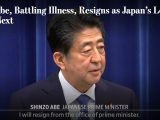Japan PM Shinzo Abe Resigns Due to Chronic Illness
August 28, 2020Japanese Prime Minister Shinzo Abe said in a press conference on Friday, August 28, that he would be retiring from his post due to a longstanding battle with chronic illness.
Abe has been diagnosed with ulcerative colitis, a chronic inflammatory bowel disease. The illness prompted him to resign as prime minister in 2007, but he returned to the post in 2012.
During his press conference in Tokyo, Abe said that he recently discovered that he needs to expand his treatment of his chronic illness, which led him to the decision to step down.
“I am sorry to our nation for having to step down,” he said. “Until the next prime minister is elected, I will fulfill my current duties.”
Abe also discussed the country’s COVID-19 response and budget.
National broadcaster NHK reported earlier on Friday that Abe was leaning towards resigning from his position.
On Monday, August 24, Abe broke the record for the longest-serving Prime Minister in Japan, serving 2,799 days consecutively in office.
Also on Monday, Abe visited Keio University's hospital for the second time in a week for a health check-up.
Abe has been diagnosed with ulcerative colitis, a chronic inflammatory bowel disease. The illness prompted him to resign as prime minister in 2007, but he returned to the post in 2012.
According to NHK, Abe said that he doesn’t want his illness to cause any inconvenience.
At 2 p.m. on Friday, Abe was seen at a meeting in the Liberal Democratic Party headquarters for over 10 minutes with secretary Nikai Toshihiro and others, according to Asahi Shimbun.
Following the NHK report, Japan’s stock market fell and the yen strengthened.
This is a developing story.


